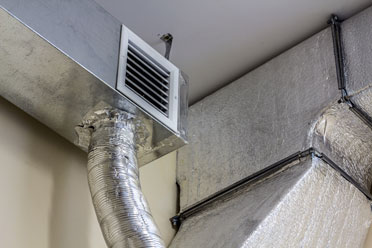Professional HVAC Duct Cleaning
Why You Need to Schedule an HVAC Duct Cleaning Appointment
Some questions have surfaced about HVAC Duct Cleaning and not everyone agrees. On one side, many people call on homeowners to clean ducts on a regular basis—perhaps as often as an annual cleaning. (Companies that clean ducts really like this suggestion.) On the other side, many consider it unnecessary. Let’s look a little further and give you enough information to come to your own decision.
On a sunny afternoon, as the sunbeams come in at an angle, you see the dust hanging in the air. It shouldn’t surprise us much; we are constantly surrounded by airborne particles, some too small to see. Inside your house, the HVAC system moves these particles with the airflow. When the heating or cooling cycle stops, gravity takes over and the particles drop to whatever surface they hover over.
The air filter captures a lot of the dust, pollen, and such, but some fall onto the surface of the vents. What happens next? Some of those particles are picked up with the next HVAC cycle, while others attach themselves to the bottom of the duct. Cleaning these particles is the source of controversy.
Like many topics of discussion, some who contribute have a compelling interest. Their argument sounds solid, but can you trust their information to be objective? The U.S. Environmental Protection Agency (EPA) has weighed in on the subject and has given some pretty objective information.1 Let’s look at a synopsis of their arguments for and against HVAC Duct Cleaning.
First, let’s start with some general statements:
- Nothing indicates that cleaning ductwork is detrimental to HVAC systems or to the health of occupants.
- There is no evidence that cleaning ducts improves the health of individuals or prevents any health problems.
- The source of airborne contaminants is the same for every home: outdoor contaminants find a way inside, indoor activities like cooking or cleaning, and just plain moving around.
In some situations, the EPA highly encourages HVAC Duct Cleaning.
- In the presence of mold. If a service provider claims you have a mold infestation, ask to see the mold. Use a clear piece of adhesive tape and take a sample. For about $50, a microbiology laboratory will analyze the sample and tell you whether it is mold and what type of mold is growing. Verify the information before proceeding. If you discover mold growth, definitely clean the ducts as part of the mitigation process.
- In the presence of vermin. If rodents or insects use the ductwork as a means of travel, clean your ducts after the pests have been removed. Droppings carry diseases and can trigger respiratory illnesses. Rodents might also carry insect pests that need to be removed from the home.
- When ducts are clogged. If a visual inspection of vent registers reveals a large amount of dust and debris that threatens to clog the vent, definitely clean the ducts.
- If ducts are connected to a fuel-burning furnace, a wood stove, or a fireplace, ducts should be inspected annually to ensure carbon monoxide cannot travel throughout the home.
It is logical to assume that dust is accumulating over time inside the HVAC ducts, so if you desire HVAC Duct Cleaning, do so. However, be wary of exaggerated claims by service providers and verify every claim.
- For “an additional fee,” service providers might recommend spraying a chemical biocide inside the ducts to kill bacteria and mold. Remember that the source of most contaminants is not inside the duct, but outside. If they spray this chemical, your family and pets must leave the home for several hours as the chemical dissipates.
- Also, for “an additional fee,” service providers might recommend the application of a sealant to keep contaminants from entering the ducts. Again, this process will not reduce the amount of dust inside the ducts, since the ducts have a positive pressure when in use, and in the case of leaks, they blow out.
Ready to Schedule Your HVAC Duct Cleaning Appointment?
For more information about R.M. Mullinix and HVAC Duct Cleaning, schedule an appointment, or visit our HVAC Duct Cleaning information page.

1 https://www.epa.gov/indoor-air-quality-iaq/should-you-have-air-ducts-your-home-cleaned
